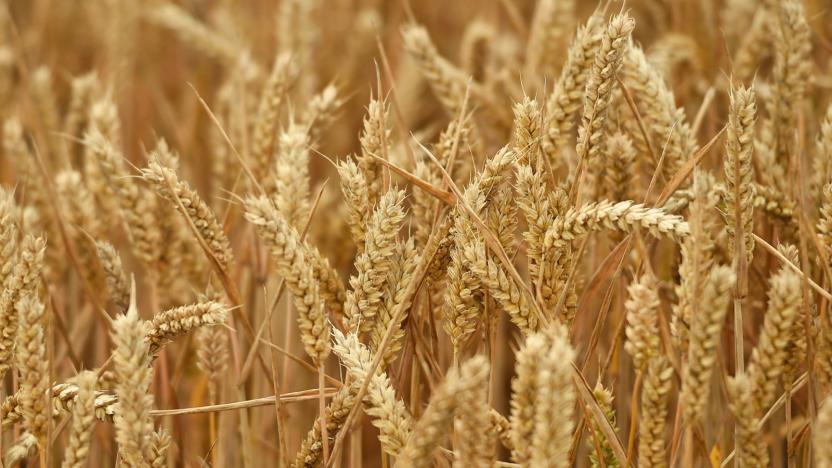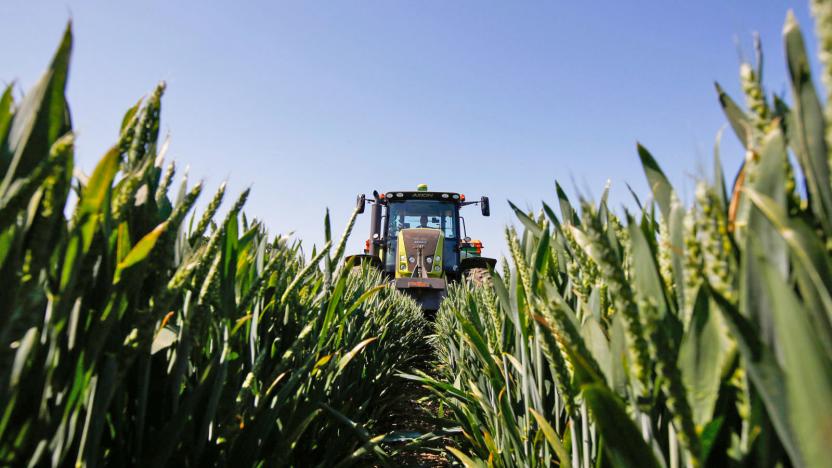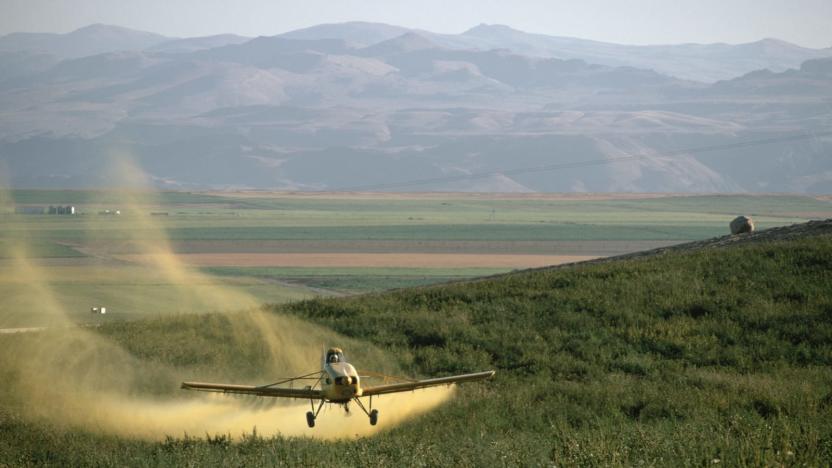crops
Latest

Arable's Mark crop sensors give farmers a data-driven edge
I've never actually set foot on a farm, but I'm inexplicably still drawn to agriculture startups -- after all, farming is one of the world's oldest professions, and nothing is quite as helpful as pure hard data. Fortunately, that's exactly what Arable specializes in: It built a crop sensor that's absolutely packed with instruments to give farmers greater insight into how their fields are doing. That's great for business, sure, but it also helps ensure that quality produce eventually ends up on our plates.

John Deere bought an AI company to optimize crop spraying
Want to know how pervasive AI is becoming in seemingly all facets of daily life? Just ask Deere & Company. The John Deere brand owner just acquired Blue River Technology, which uses machine learning and computer vision to target herbicide spraying at just the weed-infested portions of a farm field. The technology can minimize both waste and the amount of input needed while spraying, saving farmers headaches and money in the process.

Climate change could prevent food getting around the world
Climate change is bad news for basically every facet of human existence and now it's set to literally hit us in the gut by threatening global food supplies. According to a new report by leading think tank Chatham House, global warming is on course to produce more violent storms and increased flooding, affecting both crop yields and global trade routes.

Monsanto bets on AI to protect crops against disease
Monsanto has drawn plenty of criticism for its technology-driven (and heavily litigious) approach to agriculture, but its latest effort might just hint at the future of farming. It's partnering with Atomwise on the use of AI to quickly discover molecules that can protect crops against disease and pests. Rather than ruling out molecules one at a time, Atomwise will use its deep learning to predict the likelihood that a given molecule will have the desired effect. It's whittling down the candidate list to those molecules that are genuinely promising.

Crop spray gives plants GMO benefits without altering genes
Scientists have developed a clay-based RNA spray that turns off certain genes in plants, making them resistant to a virus for up to 20 days. With a single treatment, the researchers were able to protect tobacco plants from the "pepper mild mottle virus," a serious disease transmitted by humans during farm operations. On top of crop protection, the technique could be used to modify the color, taste and appearance of plants, but unlike with GMO plants, the underlying DNA would not be changed.

ICYMI: Improving pesticide's sticking abilities
try{document.getElementById("aol-cms-player-1").style.display="none";}catch(e){}Today on In Case You Missed It: MIT researchers created a kind of pesticide that is much more likely to stick on plant leaves because its additives are made of negatively and positively charged polymers that bond together. This means far less pesticide needs to be used for the same effect, and fewer pollutants are likely to get into the water system. If you're interested in watching the full dominoes video (and why wouldn't you be, that stuff is mesmerizing) you can find it here. As always, please share any interesting tech or science videos you find by using the #ICYMI hashtag on Twitter for @mskerryd.

Edit all you want, because Google Photos will keep your originals
If you're prone to overfiltering, cropping and general meddling with your photos, you just keep right at it -- if you're using Google Photos on Android. The app has been updated to ensure it keeps the original shot irrespective of how many times you resize, shape and brighten it. Now, users can save their edits or save a new copy of the photo, but irrespective of which, the original will also stay filed away inside the Photos app. The new feature is inside version 1.17 -- and I'm telling you that now so that no-one goes crazy with the cropping before they're sure they've got the right update.

Researchers grow crops on super thin film, do away with that pesky soil stuff
Here's the problem with plants: they require dirt which is, well, dirty. Japanese researchers at Mebiol have figured out a way to grow small crops of Earthly flora on clean sheets of hydrogel (commonly found in diapers), called Imec, that measures just tens of microns thick. Roots grow along the membrane, absorbing water through it, but the material is able to block out bacteria and viruses that could harm the plants. Of course, there are downsides. Water is absorbed at a much lower rate through the gel than with traditional soil, so plant size is limited and only the strongest and healthiest varieties can truly thrive on the flexible sheets. By using carefully selected plants and high quality fertilizer though, researchers were able to grow tomatoes, spinach and even melons, and hope to strengthen the film enough to support trees. Not bad for a substance normally used to absorb baby pee. Check out the video after the break.

Microsoft's Rock and Rails touchscreen lets you massage your photos with both hands
If you ever get tired of poking away at your smartphone's screen like a doorbell, you're not alone. The forward-looking folks over at Microsoft Research have been working away at a new touchscreen system designed pick up on more natural, whole-hand movements, effectively allowing users to break free from the finger-based paradigm that governs most tactile devices. Developed in coordination with engineers at Microsoft Surface, the company's Rock and Rails interface can detect three basic hand gestures: a balled fist, which holds items on the screen, an extended hand that can align objects (see the cell marked "d," on the right) and a curved paw, around which users can pivot images (see cell b). This taxonomy opens up new ways for users to crop, re-size or generally play around with their UI elements, though it remains unclear whether the display will trickle down to the consumer level anytime soon. For now, it appears to operate exclusively on the Surface, but more details should surface when the system's developers release a paper on their project, later this year. Hit the source links to see a video of the thing in action.

Cellphones are dangerous/not dangerous, bee killing edition
Apparently, we should all feel incredibly guilty for simply using our cellphones, as not only are we encouraging the growth of ear tumors within our bodies, but now we're hearing that radiation flying out from our mobiles are demolishing the world's supply of crops. All jesting aside, a controversial report is now claiming that "radiation from mobile phones are interfering with bees' navigation systems, preventing the famously homeloving (and pollinating) species from finding their way back to their hives." The comically-named Colony Collapse Disorder (CCD) is reportedly being seen on a much larger scale in the US and Europe, and elusive "evidence" is purportedly backing these dodgy claims up. Backers of the shocking data are even going so far as to suggest that in the future, our refusal to set aside the cellphone could cause "massive food shortages as the world's harvests fail." Man, this sounds worse than Y2K, for sure.[Via Slashdot]








